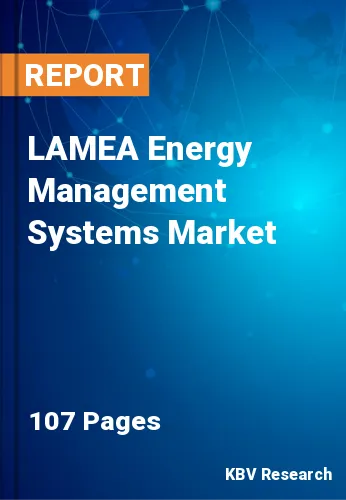The Latin America, Middle East and Africa Energy Management Systems Market would witness market growth of 17.1% CAGR during the forecast period (2022-2028).
The growing usage of renewable energy sources, such as solar panel systems in commercial and residential settings, is likely to boost demand for energy management system solutions. The growing number of dependable information technology platforms for regulating and optimizing available resources to deliver personalized as well as relevant data for corrective measures and enhanced monitoring of energy-efficient solutions is a major element driving the EMS industry forward.
The market is being driven by the growing use of smart meters and smart grids. With rising energy consumption and outdated power infrastructure, governments throughout the world are increasingly turning to smart grid technologies to modernize their energy infrastructures.
The rising demand for EMS solutions has been fueled by the rapid rise of well-organized retail and healthcare sectors. Moreover, due to the quick commercialization of novel products such as multi-network SCADA integration and other similar technologies, investments in these sectors are likely to increase. Additionally, energy management systems are frequently used in a variety of businesses since they provide information on electrical energy utilization by area and department.
Nigeria's energy management systems industry is a rapidly growing that has the potential to become a significant source of revenue for the country. The residential energy management systems market is primarily concerned with the growth and improvement of manufacturing, storage, and distribution facilities in the country. Nigeria's focus on the energy sector has led to the development of energy management systems. Changing trends and energy demands in the country have had a favorable impact on the energy management systems business. Despite considerable economic problems during the 2008 financial crisis, Nigeria has a considerable per capita income. The country also has a favorable demographic structure, which is necessary for its rapid growth.
The Brazil market dominated the LAMEA Energy Management Systems Market by Country in 2021, and would continue to be a dominant market till 2028; thereby, achieving a market value of $1,987.7 Million by 2028. The Argentina market is poised to grow at a CAGR of 17.8% during (2022 - 2028). Additionally, The UAE market would witness a CAGR of 16.8% during (2022 - 2028).
Based on Component, the market is segmented into Solution and Services. Based on Type, the market is segmented into Industrial, Building, and Home. Based on Application, the market is segmented into Commercial and Residential. Based on End User, the market is segmented into Energy & Utilities, IT & Telecom, Manufacturing, Retail, Healthcare & Life Sciences, and Others. Based on countries, the market is segmented into Brazil, Argentina, UAE, Saudi Arabia, South Africa, Nigeria, and Rest of LAMEA.
Free Valuable Insights: The Global Energy Management Systems Market is Predict to reach $107.1 Billion by 2028, at a CAGR of 15.6%
The market research report covers the analysis of key stake holders of the market. Key companies profiled in the report include General Electric (GE) Co., Siemens AG, Yokogawa Electric Corporation, Honeywell International, Inc., Schneider Electric SE, DEXMA Sensors, SL, Delta Electronics, Inc., Johnson Controls International PLC, C3.ai, Inc., and GridPoint, Inc.
By Component
By Type
By Application
By End User
By Country
Our team of dedicated experts can provide you with attractive expansion opportunities for your business.

